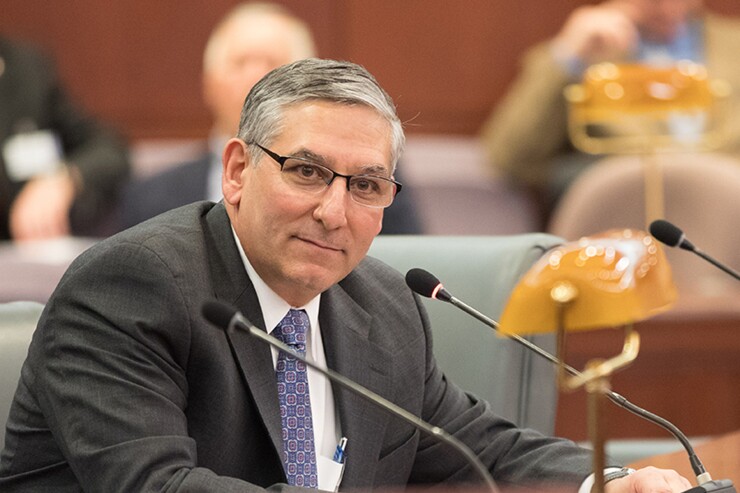The latest proposal to toll Connecticut highways — a heavy-trucks-only version headed for a vote next week — has spawned partisan bickering over whether bond-bill language could open the door for passenger vehicles as well.
Gov. Ned Lamont and top lawmakers canceled a special session on a $19.4 billion

"This is an important issue, and there is no better investment the state can make than in our infrastructure," Lamont, a Democrat, said after Friday's nine-hour public hearing by the General Assembly's transportation committee in the Legislative Office Building in Hartford.
Lamont's plan would toll trucks at selected bridges on interstates 84, 91, 95, 395 and 684, and state Route 8. It is linked to a bonding plan of $1.7 billion for the current fiscal year. According to state transportation Commissioner Joseph Giulietti, the bridges in question need major repair work within five years.
Tolls, if approved, would take effect in 2023. State budget Secretary Melissa McCaw told lawmakers that the tolls would produce net revenue of $172 million beginning in fiscal 2023, factoring in costs such as establishing gantries.
Democrats hold a 22-14 advantage in the Senate, meaning they can lose four votes and still pass the measure. Lt. Gov. Susan Bysiewicz, a Democrat, would vote to break any tie. The Democratic majority in the House is more solid at 91-60.
Republicans have unanimously opposed highway tolling and have proposed an
State Senate Republican leader Len Fasano, R-North Haven, called the
"That bonding provision is weak at best and I would argue invites the tolling of cars, because it says that the bond covenant would only allow you to toll trucks to pay back the money that's owed," Fasano told reporters after Friday's public hearing at the Legislative Office Building in Hartford. "Well, if you say that and you add cars and trucks to it, you will have improved the value to the bondholders. You made them adequately protected.
"So that is not a covenant that can be enforced in any real sense of the word."
The state removed tolls from the Connecticut Turnpike — I-95 between New York and Rhode Island — in 1985, two years after a crash at the Stratford toll gate killed seven persons. It gradually phased out bridge tolls over the following four years.
Lamont officials have touted a diverse financing strategy that includes tapping federal loans through the Transportation Infrastructure Finance & Innovation Act and Railroad Rehabilitation & Improvement Financing at around 2%. The state would also issue general obligation bonds.
"At a time of historically low interest rates, this allows for better use of the taxpayer dollars," McCaw told lawmakers. "We have been in touch with D.C. to get a sense of how we would become eligible for these financing terms."
Both parties agree that the Connecticut's Special Transportation Fund is wobbly. They disagree over how to replenish it.The fund, backstopped by fuel taxes and various fees, pays for debt service on transportation bonding and the operating costs of the Department of Transportation and Department of Motor Vehicles. McCaw said the fund could run a deficit by 2025 without a dedicated funding source.

According to McCaw, the STF’s longtime revenue sources — fuel tax revenues and various motor vehicle fees — are increasing at less than 3% per year while transportation costs are up by 4%.
"The Special Transportation Fund is in crisis,” McCaw said. “It needs a suitable, reliable revenue stream. The current situation is untenable.”
Lawmakers asked Giulietti why the state hadn't tapped TIFIA and RIIF more often.
"The main reason almost all the systems have avoided using RIIF is because it was not as economically feasible to use RIIF. It put a lot of constraints on it, and depending on your bond rating, it was almost better in most cases to not go with the RIIF," he said.
"What we have in front of us now is ... many of you were there when the Build America people came in, They have offered numbers that are fantastic for borrowing money at, and that has changed the desire to go and use RIIF."
New York's Metropolitan Transportation Authority used RIIF to fund its positive safety control initiative. Giulietti was president of the MTA's Metro-North Railroad from 2014 to 2017.
"The reason is hasn't been used as often is because of the strings that became attached with it, and whether or not it was worth it to go through that with those strings on it at the rates that they were charging," Giulietti said. "These are very aggressive rates that are being offered right now, the best that we've ever seen."
Lamont last month revived his tolls-for-trucks initiative — a 2018 campaign talking point — despite a judge’s ruling that a lawsuit against Rhode Island’s similar move can proceed in federal court.





